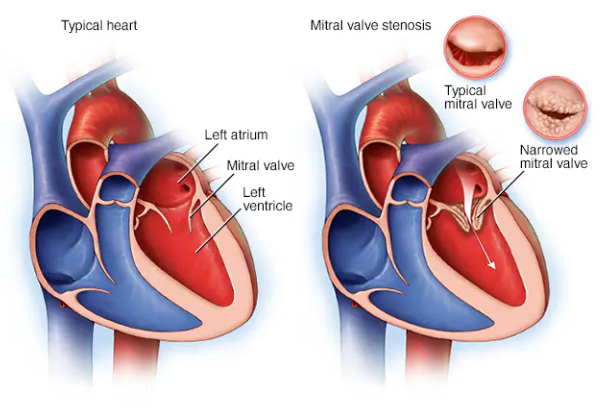Mitral Stenosis Treatment In Hyderabad
Mitral stenosis is a heart valve disorder where the mitral valve (the valve between the left atrium and left ventricle) becomes narrowed, restricting blood flow. This condition can lead to heart strain and other complications if not managed.
Mitral valve stenosis can make you tired and short of breath. Other symptoms may include irregular heartbeats, dizziness, chest pain or coughing up blood. Some people don't notice symptoms.
Treatment for mitral valve stenosis may include medicine or mitral valve repair or replacement surgery. Some people only need regular health checkups. Treatment depends on how severe the valve disease is and whether it's getting worse. Untreated, mitral valve stenosis can lead to serious heart complications.
Mitral valve stenosis can be caused by a complication of strep throat called rheumatic fever. Rheumatic fever is now rare in the United States.

Mitral stenosis is a heart valve disorder where the mitral valve—the valve between the left atrium and left ventricle—becomes narrowed, restricting blood flow through the heart. This narrowing puts extra strain on the heart and can lead to a range of complications if not properly managed.
Mitral valve stenosis often results in fatigue and shortness of breath, especially during physical activity. Other symptoms may include irregular heartbeats, dizziness, chest pain, or even coughing up blood. However, some individuals may not experience noticeable symptoms until the condition becomes more severe.
Treatment options for mitral valve stenosis vary depending on the severity of the disease and how quickly it is progressing. These may include medications to ease symptoms, regular monitoring through checkups, or more advanced interventions like mitral valve repair or replacement surgery. Left untreated, this condition can lead to serious problems, including heart failure or atrial fibrillation.
A common cause of mitral stenosis is rheumatic fever, a complication of untreated strep throat. Therefore, early diagnosis and appropriate treatment are vital to prevent long-term damage.
For those seeking expert care, Mitral Stenosis Treatment in Hyderabad is available at Rhythm Heart Clinic that offer comprehensive diagnosis, advanced treatment techniques, and compassionate patient care.
Symptoms
Mitral valve stenosis usually worsens slowly. You may not have any symptoms, or you may have mild ones for many years. Symptoms of mitral valve stenosis can occur at any age, even during childhood.
Symptoms of mitral valve stenosis include:
- Shortness of breath, especially with activity or when you lie down.
- Fatigue, especially during increased activity.
- Swollen feet or legs.
- Pounding, skipping or otherwise irregular heartbeats, called arrhythmias.
- Dizziness or fainting.
- Fluid buildup in the lungs.
- Chest discomfort or chest pain.
- Coughing up blood.
- Untreated strep infections. A history of untreated strep throat or rheumatic fever increases the risk of mitral valve stenosis. However, rheumatic fever is rare in the United States. But it's still a problem in developing nations.
- Aging. Older adults are at increased risk of calcium buildup around the mitral valve.
- Radiation therapy. Radiation causes changes in the mitral valve shape and structure. Rarely, people who receive radiation therapy to the chest area for certain types of cancer may develop mitral valve stenosis.
- Illicit drug use. MDMA, short for methylenedioxymethamphetamine and commonly called molly or ecstasy, increases the risk of mitral valve disease.
Why it’s done?
Rheumatic fever is the most common cause of mitral valve stenosis. So the best way to prevent mitral valve stenosis is to prevent rheumatic fever.
You can do this by making sure you and your children see a healthcare professional for sore throats.
Explore More : Mitral Regurgitation Treatment in Hyderabad
